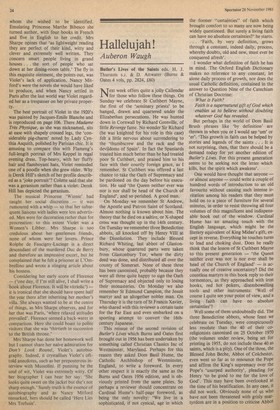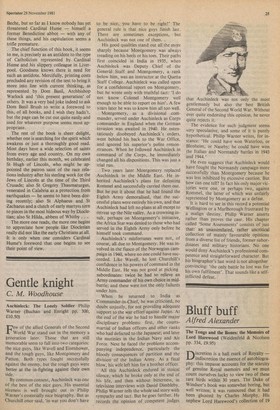Hallelujah!
Auberon Waugh
Butler's Lives of the Saints eds. H. J. Thurston S.J. & D. Attwater (Burns & Oates 4 vols, pp. 2824, £60) Mext week offers quite a jolly Callendar for those who follow these things. On Sunday we celebrate St Cuthbert Mayne, the first of the 'seminary priests' to be hanged, drawn and quartered under the Elizabethan persecutions. He was hunted down in Cornwall by Richard Grenville, of little Revenge fame. No wonder Sir Richard (he was knighted for his role in this case) felt a little nervous about surrendering to the 'thumbscrew and the rack and the devildoms of Spain'. In fact the Spaniards treated him much better than he had treated poor St Cuthbert, and praised him to his face with their courtly foreign grace, as I remember. St Cuthbert was offered a last chance to take the Oath of Supremacy and be pardoned on the day before his execution. He said 'the Queen neither ever was nor is nor shall be head of the Church of England', and so perished. A good man.
On Monday we remember St Andrew, the Apostle and Patron Saint of Scotland. Almost nothing is known about him. The theory that he died on a saltire, or X-shaped cross was thought up in the 14th century. On Tuesday we remember three Benedictine abbots, all knocked off by Henry VIII at the Dissolution. They include Blessed Richard Whiting, last abbot of Glastonbury, whose quartered parts were taken from Glastonbury Tor, where the dirty deed was done, and distributed all over the county of Somerset. None of these three has been canonised, probably because they were all three quite happy to sign the Oath of Supremacy and objected only to losing their monasteries. On Monday we also remember St Edmund Campion, the Jesuit martyr and an altogether nobler man. On Thursday it is the turn of St Francis Xavier, who shared with this reviewer a certain taste for the Far East and even embarked on a sporting attempt to convert the 16thcentury Japanese.
This reissue of the second revision of Butler's Lives which Burns and Oates first brought out in 1956 has been undertaken by something called Christian Classics Inc of Westminster, Maryland. Perhaps for this reason they asked Dom Basil Hume, the Catholic Archbishop of Westminster, England, to write a foreword. In every other respect it is exactly the same as the Burns and Oates 1956 edition, and is obviously printed from the same plates. So perhaps a reviewer should concentrate on Cardinal Hume's half-page foreword, as being the only novelty: 'We live in a sophisticated, if not cynical, age in which the former "certainties" of faith which brought comfort to so many are now being widely questioned. But surely a living faith can have no absolute certainties?' he starts. . . . 'Faith, by very definition, grows through a constant, indeed daily, process, whereby doubts, old and new, must ever be conquered afresh'.
I wonder what definition of faith he has in mind. The Oxford English Dictionary makes no reference to any constant, let alone daily process of growth, nor does the usual Catholic definition, contained in the answer to Question Nine of the Catechism of Christian Doctrine:
What is Faith?
Faith is a supernatural gift of God which enables us to believe without doubting whatever God has revealed.
But perhaps in the world of Dom Basil Brush phrases like `by definition' are thrown in when you or I would say 'urn' or 'er'. 'This growth in faith can be helped by stories and legends of the saints . . . It is not surprising, then, that there should be a demand today for yet another edition of Butler's Lives. For this present generation seems to be seeking not the letter which kills, but the spirit which awakens'.
One would have thought that anyone — or almost anyone — could write a couple of hundred words of introduction to an old favourite without causing such intense irritation among his readers that they must hold on to a piece of furniture for several minutes, in order to resist throwing all four volumes of this magnificent and indispensable book out of the window. Cardinal Hume has an amazing touch with the English language, which might be the literary equivalent of King Midas's gift, except in reverse. Everything he touches turns to lead and choking dust. Does he really think that the lesson of St Cuthbert Mayne to this present generation — 'the Queen neither ever was nor is nor ever shall be head of the Church of England' — is actually one of creative uncertainty? Did the countless martyrs in this book reply to their tormentors, as they approached with iron hooks, red hot pokers, disembowelling tools and other instruments: 'Well of course I quite see your point of view, and a living faith can have no absolute certainties'?
Well some of them undoubtedly did. The three Benedictine abbots, whose feast we celebrate on Tuesday, were conspicuously less resolute than the 40 of their coreligionists canonised on 25 October 1970 (the volumes under review, being set for printing in 1955, do not include these 40 as saints, which is a pity). One of the three, the Blessed John Beche, Abbot of Colchester, even went so far as to renounce the Pope and affirm the King's supremacy over the Pope's 'usurped authority', pleading for Henry `to be good to me for the love of God'. This may have been overlooked at the time of his beatification. In any case, it did not work. Obviously none of us who have not been threatened with grisly martyrdom are in a position to criticise Abbot Beche, but so far as 1 know nobody has yet threatened Cardinal Hume — himself a former Benedictine abbot — with any of these things, and his capitulation seems a trifle premature.
The chief function of this book, it seems to me, is precisely as an antidote to the type of Catholicism represented by Cardinal Hume and his slippery colleague in Liverpool. Goodness knows there is need for such an antidote. Mercifully, printing costs precluded any revision of the text to bring it more into line with current thinking, as represented by Dom Basil, Archbishop Warlock and 'this present generation' of others. It was a very bad joke indeed to ask Dom Basil Brush to write a foreword to this, of all books, and I wish they hadn't, but the page can be cut out quite easily and used for whatever purpose seems most appropriate.
The rest of the book is sheer delight, whether one is searching for the spirit which awakens or just a thoroughly good read. Most days have a wide selection of saints from every age and country. On my own birthday, earlier this month, we celebrated St Hugh of Lincoln, who might be appointed the patron saint of the race relations industry after his sterling work for the Jews of Lincoln at the time of the Third Crusade; also St Gregory Thaumaturgus, venerated in Calabria as a protection from earthquakes — he seems to have been dozing recently; also St Alphaeus and St Zachaeus and a clutch of early martyrs torn to pieces in the most hideous way by Diocletian; also St Hilda, abbess of Whitby. . .
The more one reads, the more one begins to appreciate how people like Diocletian really did not like the early Christians at all. It is only when one considers Cardinal Hume's foreword that one begins to see their point of view.















































 Previous page
Previous page